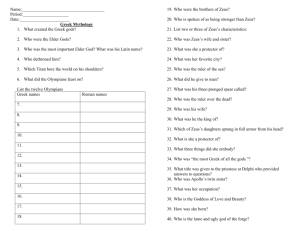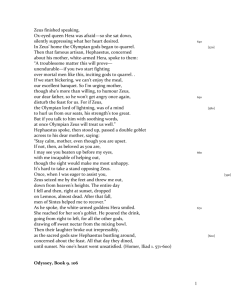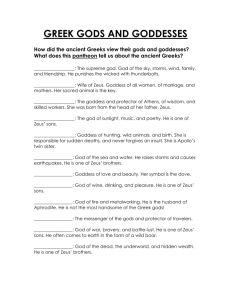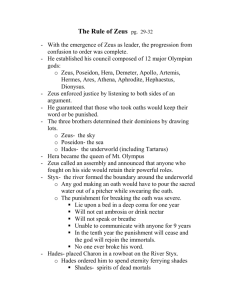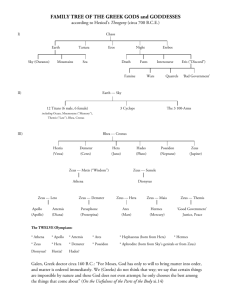Greek Gods Before Homer:
advertisement
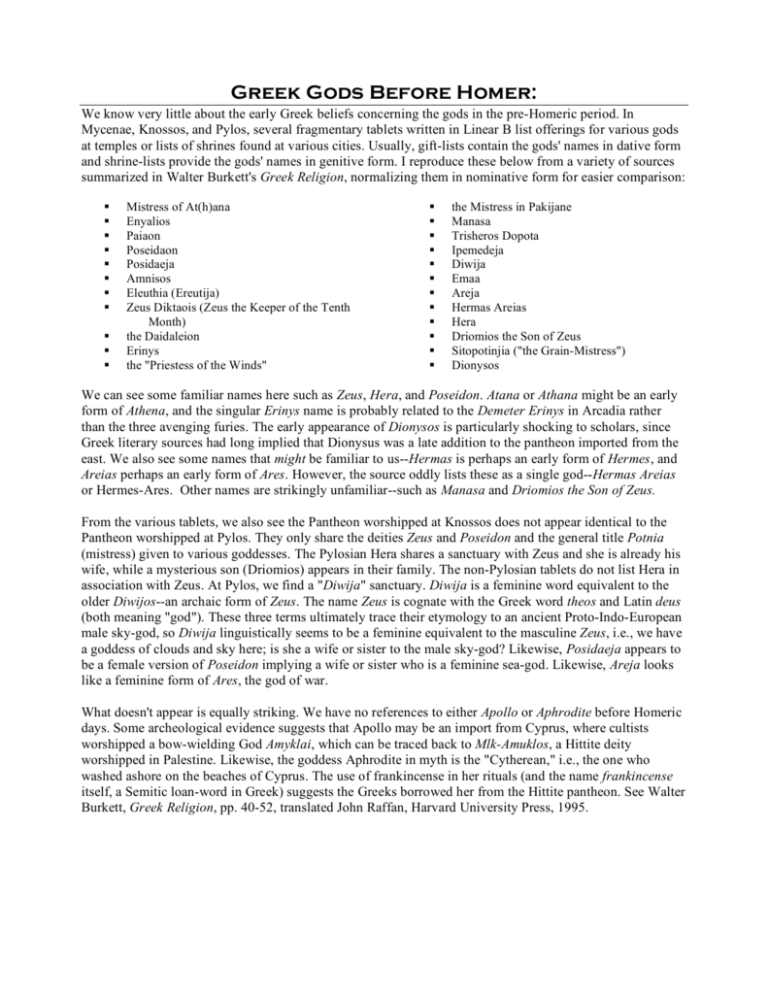
Greek Gods Before Homer: We know very little about the early Greek beliefs concerning the gods in the pre-Homeric period. In Mycenae, Knossos, and Pylos, several fragmentary tablets written in Linear B list offerings for various gods at temples or lists of shrines found at various cities. Usually, gift-lists contain the gods' names in dative form and shrine-lists provide the gods' names in genitive form. I reproduce these below from a variety of sources summarized in Walter Burkett's Greek Religion, normalizing them in nominative form for easier comparison: Mistress of At(h)ana Enyalios Paiaon Poseidaon Posidaeja Amnisos Eleuthia (Ereutija) Zeus Diktaois (Zeus the Keeper of the Tenth Month) the Daidaleion Erinys the "Priestess of the Winds" the Mistress in Pakijane Manasa Trisheros Dopota Ipemedeja Diwija Emaa Areja Hermas Areias Hera Driomios the Son of Zeus Sitopotinjia ("the Grain-Mistress") Dionysos We can see some familiar names here such as Zeus, Hera, and Poseidon. Atana or Athana might be an early form of Athena, and the singular Erinys name is probably related to the Demeter Erinys in Arcadia rather than the three avenging furies. The early appearance of Dionysos is particularly shocking to scholars, since Greek literary sources had long implied that Dionysus was a late addition to the pantheon imported from the east. We also see some names that might be familiar to us--Hermas is perhaps an early form of Hermes, and Areias perhaps an early form of Ares. However, the source oddly lists these as a single god--Hermas Areias or Hermes-Ares. Other names are strikingly unfamiliar--such as Manasa and Driomios the Son of Zeus. From the various tablets, we also see the Pantheon worshipped at Knossos does not appear identical to the Pantheon worshipped at Pylos. They only share the deities Zeus and Poseidon and the general title Potnia (mistress) given to various goddesses. The Pylosian Hera shares a sanctuary with Zeus and she is already his wife, while a mysterious son (Driomios) appears in their family. The non-Pylosian tablets do not list Hera in association with Zeus. At Pylos, we find a "Diwija" sanctuary. Diwija is a feminine word equivalent to the older Diwijos--an archaic form of Zeus. The name Zeus is cognate with the Greek word theos and Latin deus (both meaning "god"). These three terms ultimately trace their etymology to an ancient Proto-Indo-European male sky-god, so Diwija linguistically seems to be a feminine equivalent to the masculine Zeus, i.e., we have a goddess of clouds and sky here; is she a wife or sister to the male sky-god? Likewise, Posidaeja appears to be a female version of Poseidon implying a wife or sister who is a feminine sea-god. Likewise, Areja looks like a feminine form of Ares, the god of war. What doesn't appear is equally striking. We have no references to either Apollo or Aphrodite before Homeric days. Some archeological evidence suggests that Apollo may be an import from Cyprus, where cultists worshipped a bow-wielding God Amyklai, which can be traced back to Mlk-Amuklos, a Hittite deity worshipped in Palestine. Likewise, the goddess Aphrodite in myth is the "Cytherean," i.e., the one who washed ashore on the beaches of Cyprus. The use of frankincense in her rituals (and the name frankincense itself, a Semitic loan-word in Greek) suggests the Greeks borrowed her from the Hittite pantheon. See Walter Burkett, Greek Religion, pp. 40-52, translated John Raffan, Harvard University Press, 1995.
